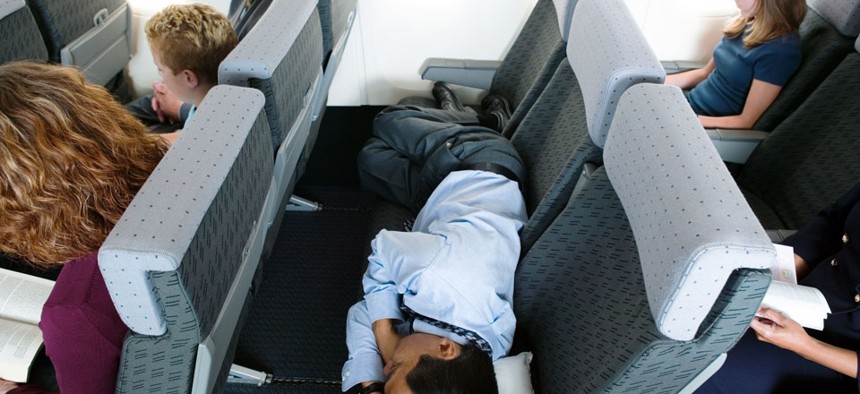
Blend Images/Shutterstock.com
Business Travelers: The Complete Guide to Fighting Jet Lag
There’s no definitive cure, but you can mitigate the effects with these tips.
Ugh, jet lag. Just when you’re dropped in an unfamiliar place—sometimes with important business—you feel groggy and useless. And there’s no definitive cure, or even a single great treatment. But you can mitigate the effects. Here are some tips:
Just be stubborn
If it’s a short trip, just stay on your local time. Jim Waterhouse, a professor of biological rhythms at Liverpool’s John Moores University, told the Wall Street Journal that he often recommends a willful disregard for your destination’s time zone. If you’re crossing three time zones or less and only staying three days or less, he said, it simply isn’t worth it to reset your body.
So if you’re going from New York to Los Angeles for a two-day jaunt, for example, and you’re typically up from 6am to 11pm, be the weirdo who’s up at 3am and asleep by 8pm. As long as all of your obligations are during normal business hours, you’ll be fine—though your mealtimes may be a bit wonky.
Don’t eat
One study (paywall) led by Harvard University Medical School professor of neurology Clifford Saper found that resetting your stomach might be a way to reset the “clock” in your brain. The researchers found that fasting for around half a day could help you adjust to a new time zone. On a trans-Pacific flight, you would fast for the entire flight, and then eat as soon at the next normal meal time in the time zone you land in.
Saper’s study used mice, but this mechanism could explain why some travelers swear by the Argonne Anti-Jet-Lag diet, invented in the 1980s.
But do drink (just not alcohol)
According to the Mayo Clinic, dehydration can make jet lag symptoms more severe. And airplane cabins have extremely dry air, so drink plenty of water on the flight.
But eschew the booze, even if you’re trying to catch some shut-eye: Alcohol will only dehydrate you further, and if it puts you to sleep your snooze will be lest restfulthan a sober nap. Besides, do you really want to deal with jet lag and a hangover?
Mind your caffeine intake
A review of current research (pdf) on jet lag treatment found that caffeine is great for alleviating the symptoms of jet lag during the day. But keep in mind that caffeine taken as long as six hours before bed can affect your sleep—so avoid the temptation to give yourself a boost to keep you awake through dinner.
Try melatonin
When your body produces a higher concentration of the hormone melatonin, you fall asleep. Because of that, many people take it at bedtime as a sleep aid. By taking 5 mg of melatonin during your destination’s evening hours on the day of travel and continuing to take it a bit before bed during the trip, a study led by University of Surrey biochemistry professor Josephine Arendt found, you can help your body change to the new timezone more quickly (paywall).
One note: Where it’s available, melatonin is sold as a food supplement—not a sleep aid—so it isn’t regulated as such. If you’re considering taking it for the first time (or for an extended period) you should check with a doctor.
Control your light exposure
Smith L. Johnston, a flight surgeon and the chief of NASA’s fatigue-management team, told the New York Times (paywall) that regulating how much light you see is key to adapting to a new time zone. But it’s more complicated than just staring at the sun when you want to feel awake.
When traveling east, Johnston said, expose yourself to light early in the day to perk you up. When traveling west, getting some light in the early evening will help keep you stay awake later. If the natural light isn’t cooperating (e.g., you’re stumbling off an east-bound flight late on a sunny afternoon) wear sunglasses if you need to block it or an artificial light source to supplement it.
You can start adjusting your light exposure before your trip starts, too: an app called Entrain is reported to cut down significantly on jet lag’s effects. Several days before your trip, you enter your origin and destination, and estimate how much light you’ll be exposed to (sitting in an office versus on the beach, for example). The app provides you with a light exposure schedule that will help you gradually move to a new time zone.
Reprinted with permission from Quartz. The original story can be found here.
(Image via Blend Images/Shutterstock.com)






